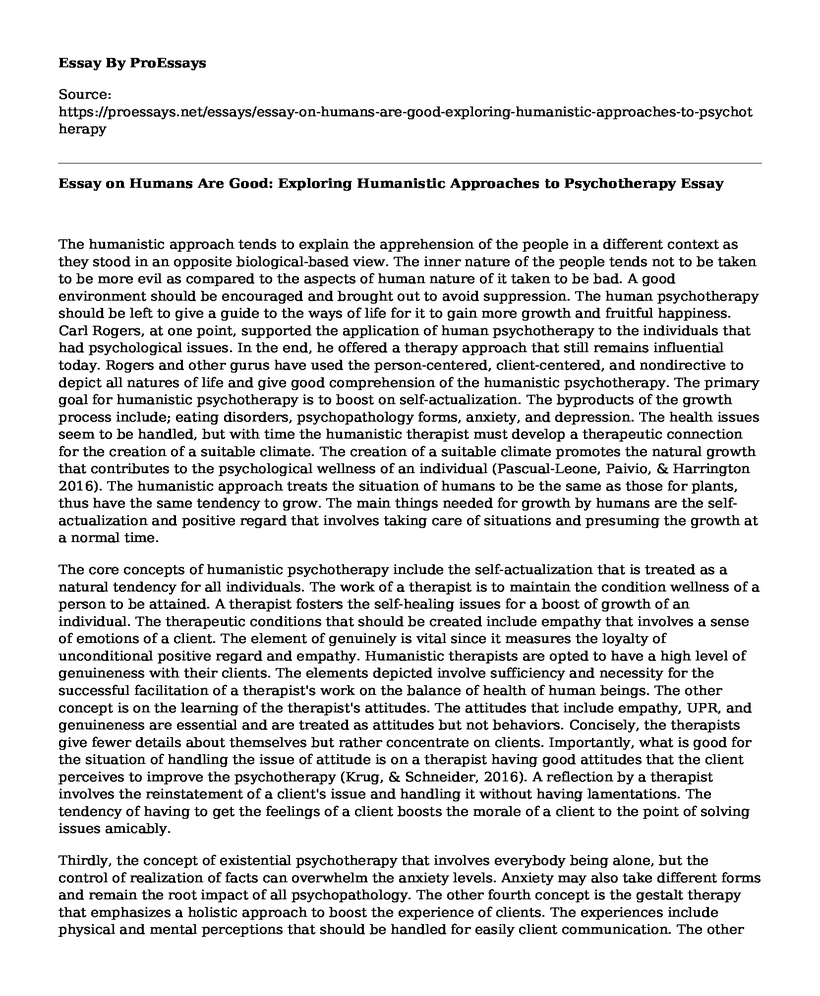The humanistic approach tends to explain the apprehension of the people in a different context as they stood in an opposite biological-based view. The inner nature of the people tends not to be taken to be more evil as compared to the aspects of human nature of it taken to be bad. A good environment should be encouraged and brought out to avoid suppression. The human psychotherapy should be left to give a guide to the ways of life for it to gain more growth and fruitful happiness. Carl Rogers, at one point, supported the application of human psychotherapy to the individuals that had psychological issues. In the end, he offered a therapy approach that still remains influential today. Rogers and other gurus have used the person-centered, client-centered, and nondirective to depict all natures of life and give good comprehension of the humanistic psychotherapy. The primary goal for humanistic psychotherapy is to boost on self-actualization. The byproducts of the growth process include; eating disorders, psychopathology forms, anxiety, and depression. The health issues seem to be handled, but with time the humanistic therapist must develop a therapeutic connection for the creation of a suitable climate. The creation of a suitable climate promotes the natural growth that contributes to the psychological wellness of an individual (Pascual-Leone, Paivio, & Harrington 2016). The humanistic approach treats the situation of humans to be the same as those for plants, thus have the same tendency to grow. The main things needed for growth by humans are the self-actualization and positive regard that involves taking care of situations and presuming the growth at a normal time.
The core concepts of humanistic psychotherapy include the self-actualization that is treated as a natural tendency for all individuals. The work of a therapist is to maintain the condition wellness of a person to be attained. A therapist fosters the self-healing issues for a boost of growth of an individual. The therapeutic conditions that should be created include empathy that involves a sense of emotions of a client. The element of genuinely is vital since it measures the loyalty of unconditional positive regard and empathy. Humanistic therapists are opted to have a high level of genuineness with their clients. The elements depicted involve sufficiency and necessity for the successful facilitation of a therapist's work on the balance of health of human beings. The other concept is on the learning of the therapist's attitudes. The attitudes that include empathy, UPR, and genuineness are essential and are treated as attitudes but not behaviors. Concisely, the therapists give fewer details about themselves but rather concentrate on clients. Importantly, what is good for the situation of handling the issue of attitude is on a therapist having good attitudes that the client perceives to improve the psychotherapy (Krug, & Schneider, 2016). A reflection by a therapist involves the reinstatement of a client's issue and handling it without having lamentations. The tendency of having to get the feelings of a client boosts the morale of a client to the point of solving issues amicably.
Thirdly, the concept of existential psychotherapy that involves everybody being alone, but the control of realization of facts can overwhelm the anxiety levels. Anxiety may also take different forms and remain the root impact of all psychopathology. The other fourth concept is the gestalt therapy that emphasizes a holistic approach to boost the experience of clients. The experiences include physical and mental perceptions that should be handled for easily client communication. The other concept is the motivational interviewing that involves revised applications of primary humanistic principles. Motivation interviewing was developed for treating misbehaviors, for instance, abuse of drugs. Lastly, is on the development of strength-based counseling and positive interventions to humanistic psychotherapy. It involves nurturing happiness for the reduction of symptoms of psychotherapy.
Conclusion
In summary, humanistic psychotherapy involves the understanding of different individuals with less guilty of evil and bad. The humanism approach tends to treat situations involving therapy of wellness that requires the reflection of therapists. Reflection of a therapist is very vital since it helps in identifying the feelings of clients that solving the psychotherapy issues amicably.
References
Krug, O. T., & Schneider, K. J. (2016). Supervision essentials for existential-humanistic therapy. American Psychological Association.
Pascual-Leone, A., Paivio, S., & Harrington, S. (2016). Emotion in psychotherapy: An experiential-humanistic perspective.
Cite this page
Essay on Humans Are Good: Exploring Humanistic Approaches to Psychotherapy. (2023, May 23). Retrieved from https://proessays.net/essays/essay-on-humans-are-good-exploring-humanistic-approaches-to-psychotherapy
If you are the original author of this essay and no longer wish to have it published on the ProEssays website, please click below to request its removal:
- Effects of Abuse on Mental Health Essay Example
- Research Articles Analysis on the Behaviors of People Paper Example
- Essay Sample on Treating Unipolar Depressive Disorder: Pharmacological & Non-Pharmacological Methods
- Essay Sample on Organizational Behavior-Motivation Theories
- Essay Example on Career Growth: Reflection and Solutions
- Essay on Good Behaviors, Bad Behaviors: A Social Learning Theory Perspective
- Essay Example on Black, White & Red, Smile Baby: Cognitive Stimulation Toy for Babies







